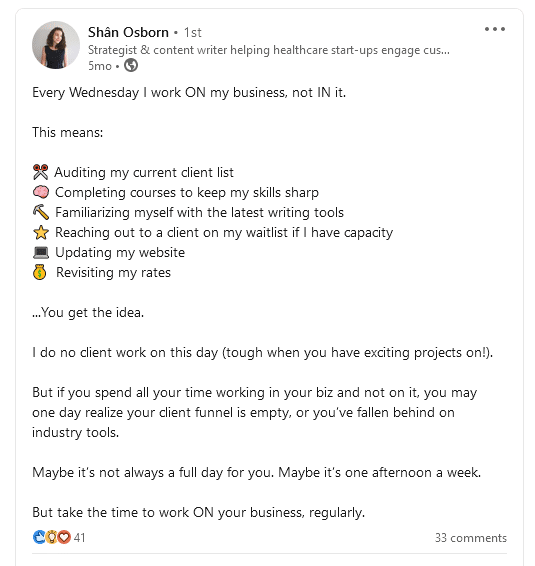Freelance digital marketing has all the ingredients for a flexible, fulfilling, and lucrative career.
It also makes a great side hustle. But starting a freelance business can be intimidating. That’s why we have put together an in-depth guide to help you find your niche, get work, and establish a sustainable solo business as a freelance digital marketer.
Key Takeaways
- Flexibility and Fulfillment: Freelance digital marketing offers a flexible, fulfilling career path or side hustle with the potential for lucrative earnings. It allows marketers to choose their clients, work hours, and location.
- Diverse Opportunities: The field encompasses a wide range of strategies and specialties, including copywriting, content writing, SEO, PPC advertising, social media marketing, influencer marketing, and website development.
- Growing Demand: With an increase in freelancers in the US from 57 million in 2017 to 73 million in 2023, there’s a clear trend towards freelancing, driven by its benefits for both companies and marketers.
- Starting Steps: To embark on a freelance digital marketing career, identify your niche, hone relevant skills, establish an online presence, set your prices, create sustainable systems, and secure your first client.
- Building Systems: Efficient systems for proposals, client onboarding, invoicing, account management, and marketing are crucial for a successful freelance operation.
- Client Acquisition: Utilizing personal networks, online job boards, and freelance platforms are effective strategies for finding initial clients. Building a reputation through referrals and quality work will sustain long-term success.
- Risk Management: Freelancers face risks such as irregular work, unpaid invoices, and insurable risks. Strategies for mitigating these include diversifying clients, setting aside money for lean periods, and obtaining freelancer insurance.
- Future Planning: Setting long-term goals and continuously adapting your business strategy are essential for growth and satisfaction in freelance digital marketing.
What Is Freelance Digital Marketing?
Digital marketing is the use of digital channels such as websites, social media, and email to promote an organization and their products and services to an online audience.
Freelance digital marketing refers to digital marketing services provided by a self-employed individual who is not a permanent, full-time employee. Freelancers are contracted to complete specific tasks and are usually paid on a per-project or hourly basis.
Benefits of Freelance Digital Marketing
For Companies
There are many benefits to using freelancers for digital marketing services. Businesses may choose to use a freelance digital marketer because they are often more affordable than a marketing agency or recruiting a permanent employee.
Freelancers are a more flexible solution. They can be hired for the exact duration they are required without any long-term commitment. Using freelancers also allows organizations to access specialist skills.
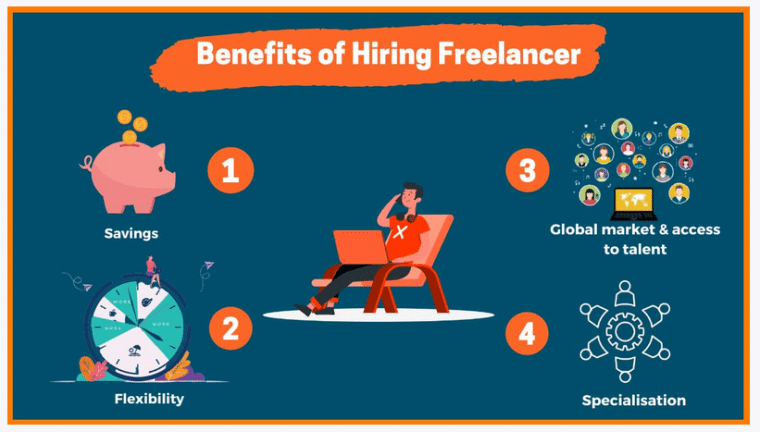
For Marketers
Freelancing is increasingly popular and not just in marketing. The number of freelancers in the US, for example, has grown from 57m in 2017 to 73m in 2023. There are lots of advantages to this work model.
You can become a freelance digital marketer without any qualifications and with little financial investment. It is a flexible and sometimes well-paying career that allows you to choose your own clients, working hours, and work location. There are opportunities for freelance digital marketers in most industries so you can choose work that aligns with your interests and values.
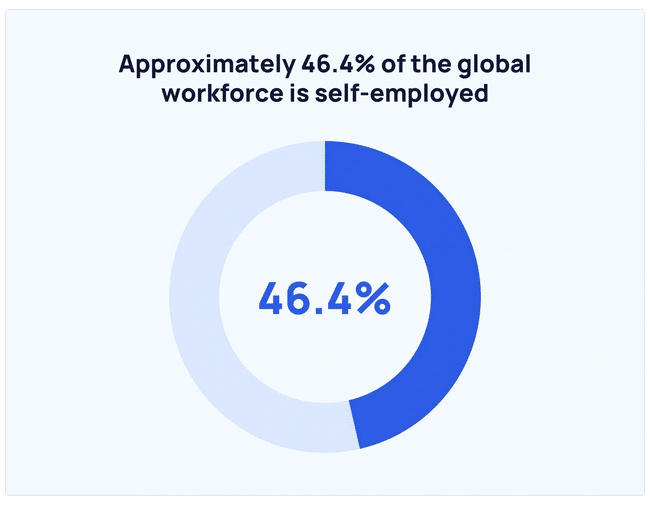
What Do Freelance Digital Marketers Do?
Digital marketing encompasses a range of strategies that businesses can employ to promote their brands, products, and services. Some freelancers specialize in one or two areas of digital marketing while others are generalists. Here are some of the main categories of digital marketing.
Copywriting
Copywriting is the production of words used by marketers to generate revenue and get people to take desired actions. It includes the text (known as copy) found on websites, ads, marketing emails, apps, social media accounts, and product packaging. Good copywriting connects with the target audience and embodies the unique voice of a brand.
Skills required for copywriting include:
- writing
- storytelling
- research
- brand strategy
Content Writing
Both content and copy refer to text used to promote a business but content marketing tends to refer to longer form content like blogs, newsletters, or podcast scripts.
Content marketing overlaps with inbound marketing. This is when businesses create valuable content that aligns with their target audiences’ needs in order to raise brand awareness. A ‘how to’ blog is an example of inbound marketing.
The skills required for content writing are similar to those required for copywriting.
Video and Podcast Production
Branded podcasts, webinars, and video content are powerful digital marketing tools. In 2022, podcast advertising generated $1.8B in revenue – a 21% increase compared to 2021 – and a record 91% of businesses now use video as a marketing tool.
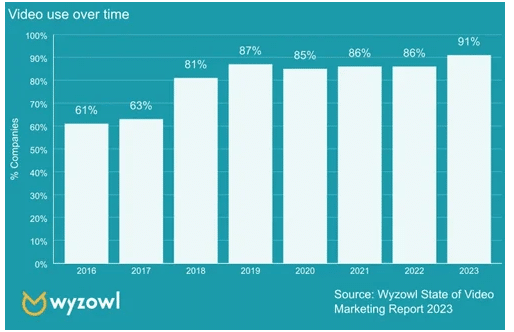
If you specialize in these areas you might be asked to:
- Come up with ideas for content
- Source podcast guests and prepare interview questions
- Organize a webinar
- Work on a video production set
- Edit video using Premiere Pro
- Track audience engagement
Search Engine Optimization (SEO)
Search Engine Optimization is a way of improving a website’s visibility in Google search results. A good SEO strategy will make it easier for your target audience to discover your client’s website and, hopefully, generate new leads for their business.
There are two main aspects.
- Keyword-related SEO: This is engaging, helpful content containing keywords searched by your target audience. Examples of SEO content include blog posts and YouTube videos.
- Non-keyword SEO: These are technical things (e.g improving page load speed) that a developer or digital marketer can do to make it easier for Google to scan a website and find the right things.SEO combines creative skills, like writing, with more technical skills, like understanding SERPs.
Pay-Per-Click (PPC) Advertising
PPC is an online advertising model where advertisers pay each time someone clicks on their online ads. Organizations can place ads on Google, Facebook, LinkedIn, and Amazon, among other platforms. Paid advertising on search engines is also referred to as SEM (Search Engine Marketing).
A tech-savvy, creative, analytical thinker with writing and graphic design skills will thrive in this role.
Social Media Marketing
Freelance digital marketers use social media platforms like Instagram, Twitter, and LinkedIn to promote their clients. This involves:
- planning and publishing content (including text, videos, and images)
- audience engagement
- creating and running ads
- using analytics tools
- developing social media marketing strategies
This niche may suit you if you love to use social media in your personal life and enjoy writing, graphic design, video production, and trend-spotting.
Influencer Marketing
Influencer marketing is when businesses collaborate with people who have a social media following in order to increase brand exposure. The influencer marketing industry has tripled since 2019 and is now worth $21B.
Influencer marketers need to understand the social media landscape and be able to identify influencers who match a client’s audience, brand, and budget. They also need the communication skills to negotiate an agreement.
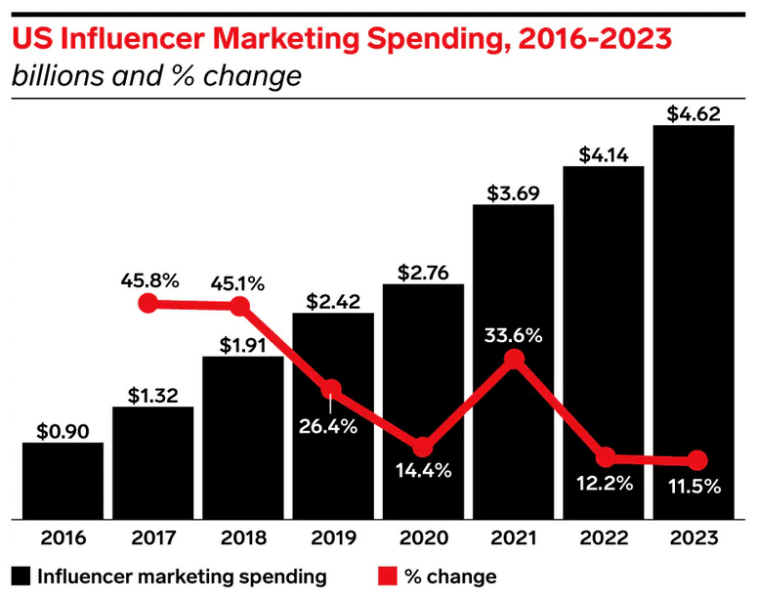
Website Development
As a freelance digital marketer, you could work on the design, coding, copy, content and functionality of clients’ websites. Useful web development skills for freelancer marketers include:
- Front-end tools like HTML, CSS, and JavaScript
- Back-end tools like WordPress or Drupal
- A basic understanding of user experience (UX)
Business Operations
In addition to helping clients reach their goals, freelance digital marketers dedicate time to the operation of their own business. It’s important to cultivate these essential business skills.
- Marketing your services
- Pitching to new clients
- Tracking industry trends
- Nurturing client relationships
- Managing your accounts
- Reviewing your business strategy
How to Get Started in Freelance Digital Marketing
Here is our step-by-step guide to becoming a freelance digital marketer. Following these steps should help you avoid common mistakes and set you up for a successful freelance digital marketing career.
Choose Your Niche
There is lots of work out there for freelance digital marketers but there is also a lot of competition. Choosing a niche helps you stand out and hone specialist skills. You can specialize by:
- Marketing channel
- Industry
- Business type/size
Your niche could be broad or narrow. Here are some examples:
- email newsletters for European health-tech startups
- high-end video production for any industry
- SEO for B2C ecommerce companies
- social media management for small, local businesses
So how do you choose the right niche?
1. Self-evaluation
Think about your skills, knowledge, and interests. Are you tech-savvy or a gifted writer? Are you always the first to spot a new TikTok trend? Do you have industry experience? How can you turn your unique background into a selling point?
2. Research
Investigate the niches that interest you. How much could you earn? What skills are required? How much work is available? You can find out by looking at freelancing platforms like Fiverr or job boards like All Things Freelance Writing and by engaging with other freelancers. You could even test a niche by taking on a small project.
3. Write an elevator pitch
Sum up your unique offering in a single sentence that you can use to promote yourself to potential clients. For example, “I specialize in building affordable, Google-optimized websites using WordPress.” You can use your elevator pitch on your LinkedIn profile, in client pitches, and for networking purposes.
Top tip: You might not find your niche right away. Take the work you can get and try different things until you figure out what works best.
Hone Your Skills
You don’t need a degree or years of experience to become a freelance digital marketer but you will need to develop specific skills. Here’s how.
Step 1: Read, Read, Read
There are lots of online resources available for freelance digital marketers, many of them free. Check out:
- Content from other freelancers e.g. Lizzie Davey (content) and Shlomo Genchin (copywriting)
- LinkedIn Learning (free one month trial available)
- Free courses from Google and HubSpot Academy
- Paid courses from Udemy, Career Foundry, Coursera, and FutureLearn
- Content from marketing tool providers e.g. TikTok Academy, Adobe tutorials, Ahrefs blog, Buzzsprout
- Books (see this useful directory)
Step 2: Study Your Niche
Study how other marketers are using particular channels. For example, if you are interested in email marketing, sign up for lots of emails. Take note of what works and what made you want to unsubscribe.
If you want to specialize in a particular industry, immerse yourself in that industry. Familiarize yourself with the major brands, the challenges and changes facing the industry, and related jargon and news.
Step 3: Practice Makes Perfect
Once you’ve studied the basics, it’s time to start ‘doing’. Treat yourself as your first client and market your digital marketing business. If you want to be a freelance writer, start a blog. Practice common freelance skills by building your own website or LinkedIn following. Or practice by creating fake ads for real businesses. Design a billboard for Apple or create Google ads for Rolex.
The most important thing is to get feedback. Share your work in an online community of marketers, on social media, or with a mentor.
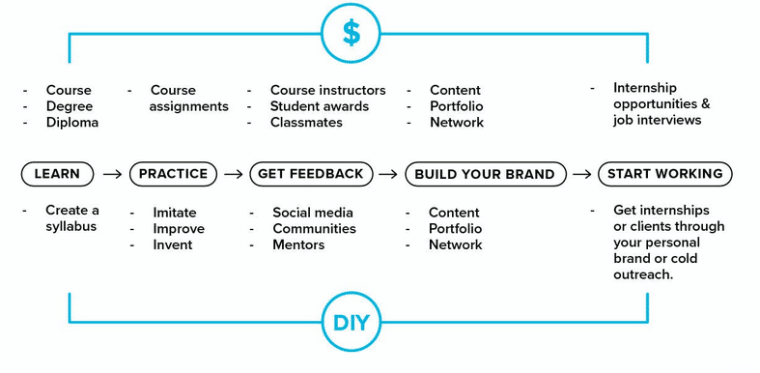
Establish an Online Presence
An online presence can help you attract new clients and demonstrate your credibility as a freelance digital marketer. It can include a website, blog, social media, and many other tactics. Start by asking:
- Who is my target audience?
- How are other marketers in my niche promoting themselves?
- What is my unique selling point?
- What is my personal brand?
- How much time and money am I willing to commit to building my online presence?
- What are my goals? e.g. attract new leads or network with other marketers
- How will I measure the impact of my online presence?
Use this information to form a strategy. You can easily build a simple website with tools like Wix and WordPress. If you decide to use social media, study the algorithm behind your chosen platform to maximize your chance of growing an audience. Most social platforms elevate users who post regularly.
Measure the results of your strategy so you improve it over time. Review and update your website and profiles regularly to include new examples of your work and client testimonials.
Set Your Prices
When you’re starting out as a freelance digital marketer, it’s difficult to know how to price your services. The first thing to consider is your billing structure. Hourly and per project billing are both common approaches. Here are their pros and cons.
Hourly billing
Pros:
- You get paid for the time you put in – no matter how many revisions the client requests.
- It’s straightforward. You can easily track your hours with tools like Toggl.
Cons:
- It punishes efficiency.
- It can make your income unpredictable.
- Your earnings are limited by the hours in a day.
Per project billing
Pros:
- You can predict your income – and your client can budget accordingly.
- You can bill for the total value you add, not just your time.
Cons:
- You could lose out if the project takes longer than planned.
- It’s harder to calculate.
You will also need to take into account your clients’ billing preferences.
Calculating an Hourly Rate
To gauge a suitable hourly rate, take a look at advertised salaries for full-time marketers in your niche and ask other freelancers what they charge. It’s also a useful exercise to work backwards from your desired annual income using this formula:
Annual salary/[total weeks in a year – vacation weeks]/[hours you will work in a week – non-billable hours] = hourly rate
Non-billable hours are the hours you spend doing tasks like pitching new clients or preparing invoices. You will likely only spend 60-80% of your working hours on billable tasks.
So, if you want to earn $50k/year before tax and work 30 billable hours/week, 48 weeks of the year, your calculation is:
50,000/48/30 = $34/hr.
To work out a per project rate, multiply this rate by the estimated number of hours you will work on the project. Track your hours so you can improve your estimates for future projects.
Create Sustainable Systems
As part of your freelance business operation, you will need systems in place to:
- Create proposals
- Onboard new clients
- Send invoices
- Manage your accounts
- Market your business
The more organized and automated your systems, the more time you can spend on billable tasks.
To start with, look into the pros and cons of opening a business bank account and legally registering your business. Create templates for documents you will present to clients, such as proposals. And set aside time to investigate these useful tools for freelance digital marketers:
- For invoicing and taxes – wave, Quickbooks, and Ember
- For client communications – Slack, Loom, and Calendly
- For promoting your business – Canva, Buffer, and MailChimp
- AI time-savers – Jasper AI, Surfer SEO, and Zapier
Get Your First Client
When you’re starting out, lean on your network. Referrals through friends, family, and professional contacts are a great way to find work if you haven’t built up a reputation yet. Explore online job boards and freelance platforms like Upwork and Fiverr for projects that will build out your portfolio. Network with freelancers in your niche and they may send work your way. Finally, pitch your skills to businesses that might need them, especially former employers or those in your local area.
Create a Safety Net
As a freelance digital marketer, you will face various risks. Here’s how you can protect yourself.
1. Having no work.
Freelancers often experience ‘feast and famine’ i.e. lots of work one month and little work the next. To protect yourself:
-
- Invest in ongoing marketing.
- Avoid committing all your time to one client.
- Avoid young startups with unpredictable needs.
- Push for longer contracts with your best clients.
- Put money aside in busy periods.
2. Unpaid invoices.
Most freelancers have experienced late payments or unpaid invoices. When you start a contract, agree on the payment period. Don’t be afraid to chase overdue payments. Where possible, quiz your network to find out if a client is reliable before you take them on.
3. Insurable risks.
Freelancer insurance can cover you in a number of situations including being unable to work because of sickness or if you face legal action from an unhappy client.
Plan for The Future
As you build your business, bear in mind your long term goals. Take your values, interests, lifestyle, and financial goals into account. Maybe you want to build up a small team of freelancers, start a marketing agency, or progress to more specialized work. Perhaps you want to keep things as they are. Let your goals inform the day-to-day decisions you make.
Tips to Succeed in Freelance Digital Marketing
Here are our top tips for starting a freelance digital marketing business.
Financial:
- Raise your rates regularly.
- Keep proper accounts from day one.
- Don’t forget to set aside your taxes.
- Have a plan for quiet periods.
- Never assume a contract will be renewed.
Performance:
- Use tools that save you time and improve your service.
- Remember that everything you do reflects on your brand.
- Always think about how you can make life easier for your clients.
- Never stop learning.
Self-care:
- Learn to manage your time.
- Set boundaries to maintain work-life balance.
- Schedule time off (even though it costs you money).
- Remember, you can choose not to work with clients who make you unhappy.
Finally, connect with other freelance marketers. You won’t regret it.
Freelance Digital Marketing vs Full-Time Marketing
There are pros and cons to both freelance and full-time, salaried work. Depending on your personal situation, one or the other may suit you better.
Freelancing offers freedom but it is unpredictable and requires you to take responsibility for the operating of a business. Working in-house or for an agency, on the other hand, gives you security and more interpersonal engagement, but limits your freedom.
Here are the main differences between these two work models.

The Bottom Line
Freelancing presents a host of challenges but, with the right preparation and systems in place, you can build a sustainable digital marketing career that is perfectly tailored to your skills and lifestyle, and reap the rewards of growing your own business while helping clients to grow theirs.

